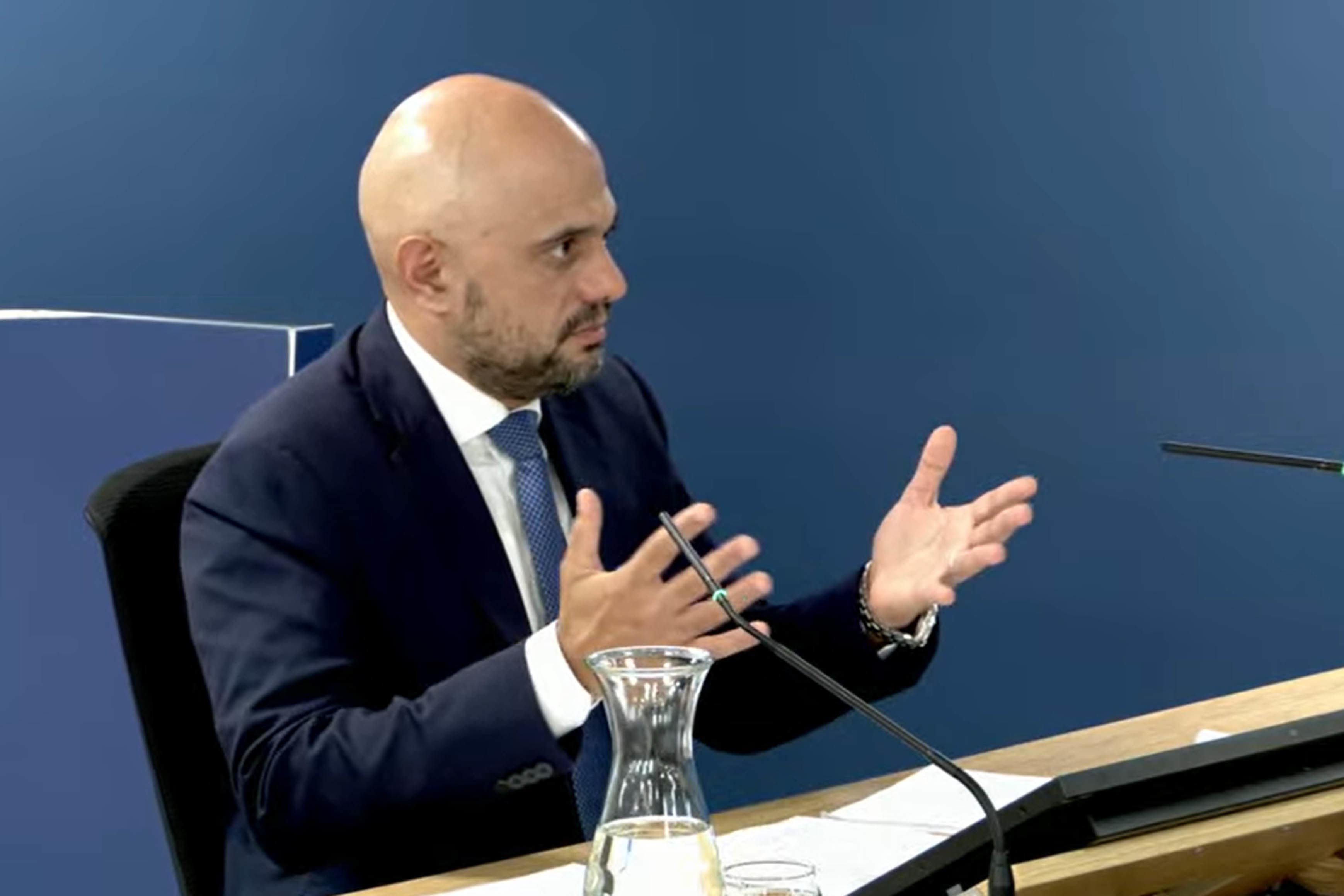Having ‘inexperienced’ Cabinet gave power to Cummings, Covid inquiry told
Former chancellor Sajid Javid has described a ‘dysfunctional’ and ‘toxic’ culture in Number 10 as the pandemic began to take hold.

Former health secretary Sajid Javid has said the “inexperienced” Cabinet at the start of the pandemic was designed to give Dominic Cummings power over decisions.
In a written statement to the Covid-19 Inquiry, Mr Javid said there was a goal at the time to “centralise power in Number 10 with a preference for loyalty over experience”.
Mr Javid, who resigned as chancellor on February 13 2020, said the arrangements often excluded ministers from decision making.
He added: “It was clear that in Mr Cummings, the prime minister had picked someone that he had decided to, for whatever reason, to trust with a huge amount of responsibility and power.
“Many times I felt like many of the key decisions were being made by Mr Cummings and not the prime minister in a way that I had not seen with any other prime minister. That is something I had to work with.”
In his statement, Mr Javid said the Cabinet in early 2020 had “less experience of being in Government or holding offices of state than many previous cabinets”.
He added that ministers were chosen solely to support Boris Johnson to deliver Brexit.
I think it was a widespread feeling among a lot of the political advisers working in Number 10, many ministers, the Number 10 operation collectively was quite dysfunctional
Mr Javid told the inquiry that Mr Cummings had “sought to act as a prime minister” but when he was chancellor he had been able to stop or delay policies that Mr Cummings wanted to implement.
He also said Mr Cummings constantly made “many requests” for information, with Mr Johnson generally unaware that the request had “come in his name”.
He was asked whether in early 2020 there was a “toxic”, “dysfunctional” and “feral” culture in Number 10 as described by other witnesses.
Mr Javid said: “Yes, broadly. I think it was a widespread feeling among a lot of the political advisers working in Number 10, many ministers, the Number 10 operation collectively was quite dysfunctional.”
Describing the circumstances surrounding his resignation, Mr Javid said that Mr Johnson tried to persuade him to stay on in the role but insisted he must replace his senior advisers.
Mr Javid then entered a separate room to reconsider his decision to step down, which he told the inquiry was because the prime minister was “not in charge” and Mr Cummings was “running the government”.
Mr Javid described being joined by then Downing Street chief of staff Sir Edward Lister and the deputy cabinet secretary at the time, Helen MacNamara.
He added: “They both came in to say the same thing which was the prime minister is only doing this because of Dominic Cummings. He has asked him to do this and the prime minister doesn’t know what he is doing in asking you to do this. This is all Dominic Cummings. Don’t fall for it.
“Their message was that Dominic Cummings will be gone within a few weeks. There is no way he can survive the way he is going.”
Ex-deputy prime minister Dominic Raab later rejected Mr Javid’s claim that Mr Johnson was not in charge of the Government over the period.
When asked if he agreed with this view during his appearance before the inquiry, Mr Raab said: “No, I don’t.”
He added: “There is a whole circus that can be built up in the media and elsewhere around the internal battles between individuals and some of that is natural and healthy.”
Mr Raab said he had “no beef” with Mr Javid, but simply disagreed with the former health secretary’s position. He added Mr Cummings was “trying to galvanise direction of travel” in Government which was “much needed”.
The inquiry later heard Mr Javid was not invited to key meetings when the Omicron variant of Covid-19 was on the rise.
In a diary entry, former chief scientific adviser Sir Patrick Vallance wrote it was “quite extraordinary” that the then-health secretary was not invited to the meeting in mid-December 2021.
Asked why he was not invited to the meeting, Mr Javid said: “Not to have my input and therefore the input of my department – and that includes not just obviously UKHSA (UK Health Security Agency), the CMO (chief medical officer), NHS – so I don’t know why I wasn’t included. You will have to ask the former prime minister.”
I sincerely hope that this inquiry gets to the bottom of what happened in our country at the time, and that as a country we learn lessons from it so that if there is another time, we are just so much better prepared
As he began to give evidence, Mr Javid made a statement in which he thanked inquiry chair Baroness Hallett for the opportunity to appear.
He added: “I fully support the work of the inquiry.
“The impact of the pandemic was, of course, unprecedented in our country and across the world.
“Sadly, many people lost their lives and there are many loved ones who are still grieving. I know some of them are here today as well.
“I perhaps will never fully understand the scale of their grief but I sincerely hope that this inquiry gets to the bottom of what happened in our country at the time, and that as a country we learn lessons from it so that if there is another time, we are just so much better prepared.”
Bookmark popover
Removed from bookmarks